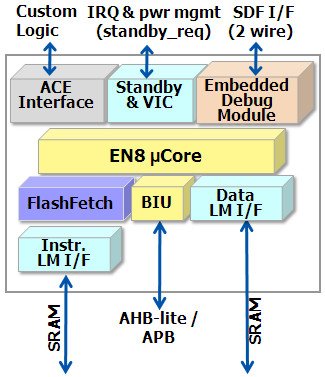Andes Technology, the Taiwanese processor core vendor, has launched an SoC development solution, the Andes Custom Extension (ACE) framework, and the first supporting AndesCore processor, the EN801.
“The launch of the ACE framework responds to our customers’ increasing demands for extensible processors after they encounter all sorts of problems during SoC development,” says Andes CTO Charlie Su, “they are not satisfied with traditional extensible processors using complicated tools restricted to high-end applications and the early-stage baseline CPU cores in these processors. Some existing extensible processors don’t even come with any baseline CPU core, forcing customers to develop one themselves.” The ACE framework can be used from DSP acceleration and high-volume data processing to emerging applications whose features and specifications are still evolving such as IoT, wearable devices, smart sensor devices, medical devices, storages, packet processing, intelligent household appliances, touch panels, wireless charging, fingerprint identification, SSD and encryption security chips.
The ACE framework can be used from DSP acceleration and high-volume data processing to emerging applications whose features and specifications are still evolving such as IoT, wearable devices, smart sensor devices, medical devices, storages, packet processing, intelligent household appliances, touch panels, wireless charging, fingerprint identification, SSD and encryption security chips.
Supported by the ACE framework, the EN801 is the first extensible AndesCore. Designers can create application-specific instructions to meet the most stringent product requirements with high performance efficiency. The resulting programmable acceleration allows a single chip to offer more functionalities than those relying on hardwired engines. For instance:
AMADDoperationwithtwo16x16bitmultiplicationaddedto32bitshas8times speedup.
AFIRfilterwith64bitsofprecisionachieves17timesspeedup.
A32-bitCRC32operationdeliversover90timesspeedup.
Under the ACE framework are the ACE language and COPILOT tool (Custom-OPtimized Instruction deveLOpment ToolsTM) to simplify the instruction
design process.
Based on ACE descriptions, COPILOT generates the corresponding extended RTL, verification environment and relevant extension modules to be used with Andes standard development tools, simulator and AndesCore RTL.
For more detail: Andes launches SoC design platform
